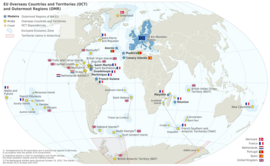Other countries

Chinaedit
The People's Republic of China has built increasingly strong ties with some African, Asian, European and Latin American nations which has led to accusations of colonialism, becoming Africa's largest trading partner in 2009. As of August 2007, an estimated 750,000 Chinese nationals were working or living for extended periods in Africa. In the 1980s and 90s, China continued to purchase natural resources — petroleum and minerals — from Africa to fuel the Chinese economy and to finance international business enterprises. In 2006, trade had increased to $50 billion expanding to $500 billion by 2016.
In Africa, China has loaned $95.5 billion to various countries between 2000 and 2015, the majority being spent on power generation and infrastructure. Cases in which this has ended with China acquiring foreign land have led to accusations of "debt-trap diplomacy". Other analysts have concluded that China is likely trying to "stockpile international support for contentious political issues."
Commentators have stated that Western perceptions of China's motives are misconstrued due to Western conceptions of development as seen through their own lens of exploitation of others for resources—as exemplified by European colonialism—instead of through Chinese conceptions of development.
In 2018, Malaysian Prime Minister Mahathir Mohamad cancelled two China-funded projects. He also talked about fears of Malaysia becoming "indebted" and of a "new version of colonialism." He later clarified that he did not refer to the Belt and Road Initiative or China with this.
According to Anderlini of the Financial Times, Pakistan is at risk of becoming a colony of China.
Langan (2017) stated that Western actors tend to paint China as a threat in Africa, othering it from themselves, but it neglects the fact that Europe, the United States, China, and other emerging powers likewise facilitate economic and political interests through aid and trade in a manner that conflicts with African sovereignty.
South Korean land acquisitionsedit
This article needs to be updated. (October 2012) |
To ensure a reliable, long-term supply of food, the South Korean government and powerful Korean multinationals bought farming rights to millions of hectares of agricultural land in under-developed countries.
South Korea's RG Energy Resources Asset Management CEO Park Yong-soo stressed that "the nation does not produce a single drop of crude oil and other key industrial minerals. To power economic growth and support people's livelihoods, we cannot emphasise too much that securing natural resources in foreign countries is a must for our future survival." The head of the Food and Agriculture Organization (FAO), Jacques Diouf, stated that the rise in land deals could create a form of " neocolonialism", with poor states producing food for the rich at the expense of their own hungry people.citation needed
In 2008, South Korean multinational Daewoo Logistics secured 1.3 million hectares of farmland in Madagascar to grow maize and crops for biofuels. Roughly half of the country's arable land, as well as rainforests were to be converted into palm and corn monocultures, producing food for export from a country where a third of the population and 50 percent of children under 5 are malnourished, using South African workers instead of locals. Local residents were not consulted or informed, despite being dependent on the land for food and income. The controversial deal played a major part in prolonged anti-government protests that resulted in over a hundred deaths. This was a source of popular resentment that contributed to the fall of then-President Marc Ravalomanana. The new president, Andry Rajoelina, cancelled the deal. Tanzania later announced that South Korea was in talks to develop 100,000 hectares for food production and processing for 700 to 800 billion won. Scheduled to be completed in 2010, it was to be the largest single piece of overseas South Korean agricultural infrastructure ever built.
In 2009, Hyundai Heavy Industries acquired a majority stake in a company cultivating 10,000 hectares of farmland in the Russian Far East and a South Korean provincial government secured 95,000 hectares of farmland in Oriental Mindoro, central Philippines, to grow corn. The South Jeolla province became the first provincial government to benefit from a new central government fund to develop farmland overseas, receiving a loan of $1.9 million. The project was expected to produce 10,000 tonnes of feed in the first year. South Korean multinationals and provincial governments purchased land in Sulawesi, Indonesia, Cambodia and Bulgan, Mongolia. The national South Korean government announced its intention to invest 30 billion won in land in Paraguay and Uruguay. As of 2009 discussions with Laos, Myanmar and Senegal were underway.
Catholic Churchedit
Historically there has been a strong connection between Christianity and colonialism.
Although not always aligned with colonial policy, for example in its opposition to slavery in the Americas, modern senior Catholic churchmen have been prominent in their pronouncements about the peoples of former colonial territories, especially during the pontificate of Pope Francis. Thus at the 2014 Synod on the Family, Cardinal Walter Kasper said that African Catholics “should not tell us too much what we have to do.” During the 2019 Synod on the Amazon, Austrian-born Bishop Erwin Kräutler, a former bishop in Brazil, said at the October 9 Synod press conference that “there is no alternative” to abolishing celibacy in the Amazon basin because the apparently primitive natives “don’t understand celibacy."
Comments
Post a Comment